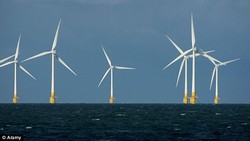A majority of New Jersey residents support the development of offshore electricity-generating wind farms, Monmouth University’s Polling Institute reported last Wednesday, April 3.
According to the poll, three-quarters of New Jersey residents would back the installment of wind power off the coast of the state. Still, the Monmouth University Poll found that 45 percent of the population would oppose further development of wind farms if their electricity bills increased.
Patrick Murray, Director of the University’s independent University Polling Institute, said, “[Residents] could become more willing to shoulder some of the investment if they are convinced it will lead to real environmental benefits.”
“There is broad, bipartisan agreement that moving forward with offshore wind projects should be a priority,” said Tony MacDonald, Director of the University’s Urban Coast Institute. “If [the state reaches] Gov. Murphy’s goal of generating 3,500 MW of electricity from offshore wind by 2030, it will put the state on a path to a green energy future.”
“In terms of climate change, and the long-term future of our students, we’re better off with sustainable energy sources than geologic ones,” said Greg Moehring, Ph.D., an associate professor of chemistry.
Jeanine Cava, an adjunct professor of chemistry and physics, agrees that wind farms would benefit the Monmouth community. “The less pressure on the need for natural gas and the more energy we can get from wind is better long-term,” she explained.
Air quality sensitivity warnings often appear on the Apple weather app in the Monmouth area. Moehring explained that it is because the New York metropolitan area generates an enormous amount of electricity. He said that utilizing more sustainable sources like solar and wind farms would improve air quality because fewer coal burning and natural gas plants need to be operated.
New Jersey residents felt that the development of offshore wind farms would “reduce carbon emissions and reliance on fossil fuels,” according to the Poll’s report.
Shannon Slattery, a sophomore political science student and self-proclaimed environmental advocate, is glad that awareness is spreading, even if it is occurring slowly. “Personally, I would love having [wind farms]. I think it would be a good alternative to natural gas,” she said.
In the report, MacDonald said that residents seem to acknowledge that long-term economic and environmental benefits of investing in clean. “Renewable energy sources outweigh any short-term costs,” he said.
Currently, burning natural gas is still cheaper than wind farms. But, in the long-run, the cost of wind warms will decrease as oil prices increase, which is inevitable since it is a limited resource, Moehring explained.
If wind farms become a reality, Moehring suggested that Monmouth students in the Marine and Environmental Biology and Policy program could benefit.
They would have a unique opportunity to utilize wind farms as both exemplars and research activities.
PHOTO TAKEN from Daily Mail



